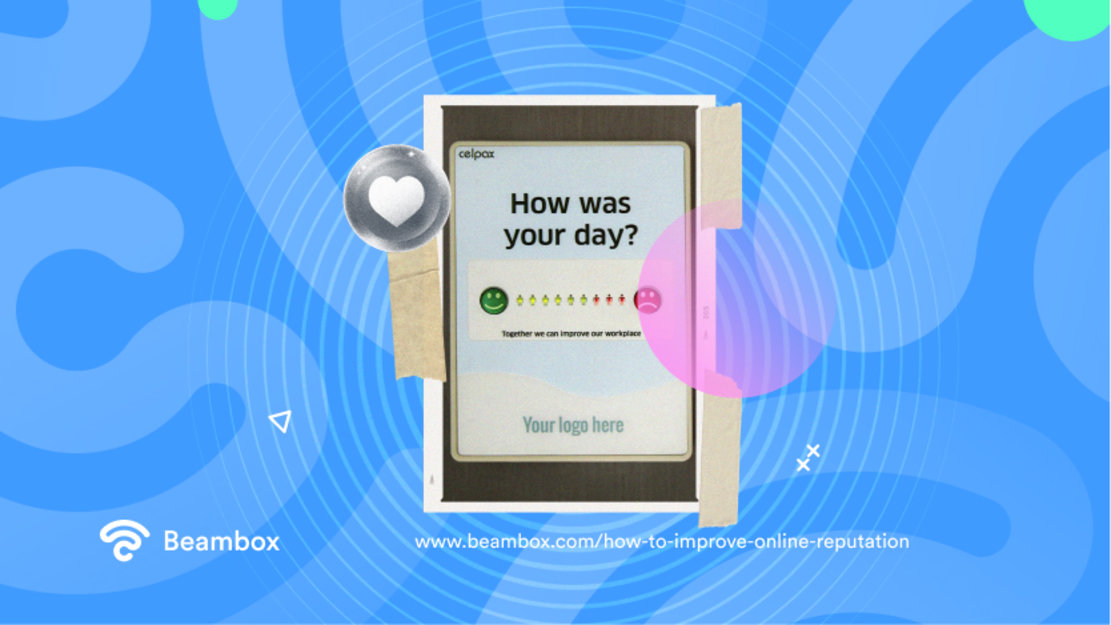How To Improve Online Reputation and Why It Matters
Potential customers rarely make a decision before checking online reviews. That’s why businesses with a damaged or non-existent online presence struggle to achieve their goals. To avoid this, they must regain control by learning how to improve online reputation.
However, even people with a stellar online reputation shouldn’t stop managing it. After all, it only takes a few bad reviews or negative comments to bring everything crashing down.
You might have difficulty grasping this concept if you’ve never managed your online reputation before. In this article, you’ll learn everything from the basics, including definition, importance, and six effective strategies.

What Is Online Reputation Management?
Online reputation management influences and manages how people perceive you or your business online. It’s about building a positive impression that reflects well on you and helps you achieve your goals.
Some people find this confusing since you can’t control what people say about you or your brand. If they find something negative about you, they’ll voice their opinion on multiple platforms.
But that’s the thing. Online reputation management isn’t about eliminating all negative reviews or stopping people from voicing their negative opinions. It’s more about how you handle those opinions and what you do about them. In fact, 88% of customers say they’re more likely to choose a business that responds to all reviews.
Why does this matter for individuals, though? Let’s say you’re a designer and have applied for a job through LinkedIn. After reviewing your application, the first thing the employer will do is check your activity on LinkedIn. They might even Google your name to find you on other social media channels.
Since you’re a designer, employers will expect to see some designs on your profile. They may judge you based on your engagement across other designer profiles.
Even new friends will do this. Besides, freelancers and content creators rely heavily on building online networks. Therefore, managing online reviews and your reputation matters in both your professional and personal life.
Here’s Why Every Business Should Manage Online Reputation
There’s no denying that people make immediate buying decisions when they hear about positive experiences from friends and family. However, this urgency increases tenfold when they see strangers promoting a business’s products and services.
Positive reviews can be a significant selling point, while negative feedback can deter customers from considering your business.
Therefore, online reputation serves as digital word of mouth that never fails to bring new customers.
Moreover, it builds trust and credibility. You’ll be engaging with both potential and existing customers, encouraging loyalty. As a result, you’ll never have any problems gaining repeat business, provided your service remains the same.
Appearing on search engines is another reason to manage an online reputation. Prompt and proactive reputation management with Google reviews creates a good impression on Google. When it sees you actively making efforts, it pushes your website to the top.
Since potential customers looking for products and services usually choose from the first few results, imagine the success you’ll get. They’ll see you as a thought leader and trust you with their money.
Besides, responding to negative reviews turns them into positive opportunities. Many people will even delete the bad reviews if the business solves its problem quickly.
Additionally, addressing negative feedback professionally and proactively demonstrates your commitment to customer satisfaction. This way, you’ll leave a positive impression on the reviewer and onlookers.
Lastly, a positive online reputation can be a powerful differentiator in a crowded marketplace. Customers come across a sea of brand promotions and ads. But they only choose the ones they can trust.

How To Improve Online Reputation: 6 Methods and Their Best Practices
Improving online reputation isn’t hard. Yet, many people ignore it. That’s because online or AI reputation management isn’t about responding to a few reviews and calling it a day. It’s about making a continuous effort and leaving no stone unturned.
However, the results are worth every second and resource you spend on it. Just the increased visibility makes this tactic worth a shot. If you want to try it yourself, here’s how to improve online reputation. The following sections will walk you through six effective methods with their best practices.
1. Take Part in Online Discussions
People often overlook the power of engaging in relevant online discussions. If you want to improve your online visibility, you have to come forward as the thought leader. You must show potential customers, employers, or connections that you know what you’re doing and have what it takes.
You build credibility and trust when you express genuine opinions in matters related to your industry. For example, a local bakery can comment on recipes and advise on improving them. This will make them stand out as a business with solid baking knowledge.
As a result, people will at least give it a chance to show its talent in taste as well. If it can prove its knowledge practically, it will easily gain loyal customers.
Moreover, you can share your company’s perspective on different industry matters and spark meaningful debates. This will put you forward as a knowledgeable entity and increase your awareness.
If you use BnB or hotel reputation management software, you can gain insights into customer feedback. You can then respond to it as needed. However, remain professional and avoid creating conflicts, which can promote a negative perception.

2. Monitor and Respond to All Reviews
There’s no concept of improving or managing your online reputation without monitoring and responding to reviews. This act is the pillar of online reputation management for businesses and individuals. Here’s how to put this method into action.
Almost all social media channels and review sites allow you to turn on notifications for new reviews and comments. The review monitoring process starts with using this option.
It doesn’t matter if the review is negative or positive; both categories deserve a response. In the case of a positive review, show your gratitude and thank the reviewer. They took time to express their thoughts about you; the least you can do is thank them. This will make the reviewer feel good and might even encourage them to leave more reviews.
You can also highlight their review on your social media profiles and tag them. This will portray you as someone who cares about customers and regards them. On the other hand, if the online review is negative, respond by apologizing for the matter. Show understanding even if it isn’t your mistake or the customer misunderstood you.
Empathize with the reviewer and give appropriate solutions. Incentivizing customers for the inconvenience they endured is a great option here.
If the reviewers feel you’ve solved the problem without further issues, they might take the review down. Even if they don’t, at least you’ve shown your commitment to solving problems, which is enough for onlookers.
3. Keep an Eye on Social Media Likes, Comments, and Mentions
In addition to customer reviews, you must monitor social media likes, comments, and mentions. These can provide valuable insights for you and your business. For example, people who follow influencers often request they make content about a specific topic. Similarly, customer communications can help businesses catch and resolve issues early on.
See who likes and mentions your brand and endorse them for cross-promotions. Sometimes, people might not mention your brand even when using your products in their content.
This probably means they’re regular customers. If that happens, you can comment with a simple thank you message for their loyalty. This way, the influencer’s followers will also notice you. Remember, small business reputation management directly relates to increased visibility.

4. Share Your Brand Story and Values
Facts and figures do bring you attention, but people connect with stories on a deeper emotional level.
Customers are most comfortable investing in businesses that they can resonate with. People appreciate knowing the “why” behind your brand.
Transparency builds confidence in your purpose and mission.
Besides, a unique brand story can give you a competitive edge and make you stand out from the crowd. So, why not use this to improve your online reputation?
Start by sharing your journey on social media accounts, especially Linkedin. How did you start, what difficulties did you face, and how did you overcome them? Such questions attract people going through a similar journey and help you build a network.
Share your values and tell people what your brand stands for. Then, integrate that narrative into your promotions as well.
5. Act on Customer Feedback
Simply responding to reviews isn’t enough. If you want customer opinions, you need to be ready to act on them. Otherwise, your customers might think their opinions and suggestions don’t matter.
Therefore, conduct regular audits of customer reviews and try to guess what your customers need. Maybe you’ll find that customers find your delivery charges too high. Or they might not be happy with the timing of deliveries. You can’t judge these issues from a single customer review.
Once you find out the problems or changing customer demands, work on solving them. For example, if you do restaurant reputation management, you can make changes as feedback comes in. Again, your customers will feel listened to, and that will encourage even more positive reviews.

6. Make It Easy To Leave a Review With In-Store QR Codes
The last method is to make it easy for customers to leave reviews. One of the main reasons why customers don’t leave reviews is the time they have to spend on it.
Therefore, display QR codes around your venue for ease of use. Customers can scan the code to visit your website, social media, or review websites.
If you’re unsure how to do that, you can use various free QR code makers. However, ensure the customer doesn’t have to follow many steps.
The scanning should be enough to take them directly to the review page. Or you could redirect them to a short survey form. Remember, the goal is to make it easy for customers to leave reviews.
Should You Hire an Online Reputation Manager or Do It Yourself?
Whether you should hire an online reputation manager or do it yourself depends on your needs. Let’s say you’re managing your social profiles and website so future friends, employers, and acquaintances can look. In this case, there’s no need to spend money on hiring a professional. You can manage your online reputation yourself.
Similarly, if you’re a small business just starting, you might not have the resources to hire someone. Again, managing your online reputation isn’t hard, so you can do it yourself.
However, if you have a lot of followers and customers, you might need to hire someone. Content creators who get thousands of comments daily can’t handle the volume themselves. The same goes for large enterprises.
In short, hiring an online reputation manager depends on your budget, needs, and preferences.

Build and Protect Your Brand With Online Reputation Management
Do you know how to improve online reputation? Monitor and respond to all reviews, both positive and negative. However, to build and protect your brand with spectacular online visibility, you must think outside the box.
Whether you’re managing your business or personal online reputation, remain active on social media. You can also:
- Use reputation management software.
- Engage with like-minded people and businesses.
- Leave likes and comments on their channels.
- Share your story.
To automate operations, try Beambox. It allows you to easily manage your reputation from one dashboard and get more positive reviews. Over 12,000 businesses use Beambox. Start your trial now!



